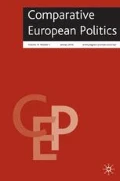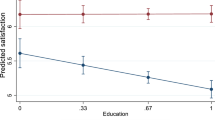Abstract
This article studies how citizens’ evaluations of the political system and its actors affect their propensity to vote. Based on the earlier theoretical and empirical research, we analyse the concepts of political trust and satisfaction that are often used in survey research. We argue that political trust has to do with the normative expectations towards political institutions and actors, whereas satisfaction may be regarded as an indicator of attitudes to policy outputs. Furthermore, we differentiate between attitudes to democratic system on the one hand and political actors on the other hand, because in representative democracies it should be possible to replace incumbent politicians at elections. We hypothesize that trust in parliament and satisfaction with democracy increase turnout, whereas trust in politicians has a smaller impact on turnout, and satisfaction with the incumbent government does not affect turnout at all. The empirical evidence is based on the first round of the European Social Survey, which was collected simultaneously in 22 countries in 2002–2003. Our analysis confirms that trust in parliament has a positive impact on turnout, and also satisfaction with democracy increases it. These effects are especially high when aggregated at a country level and when hard data on turnout are used. At the individual level, in particular trust in parliament increases the likelihood of voting.





Similar content being viewed by others
Notes
Gambetta (2000) defines trust as the agent's A subjective probability that the other agent's B actions will not be detrimental to A.
This definition of trust resembles Easton's (1965) conception of diffuse support. Easton argues that legitimacy can be regarded as a quality ascribed to the basic norms and the principles of regime. According to Easton, the sentiments of legitimacy increase the flow of diffuse support for the government. Diffuse support refers to citizens’ support for the elements of the political system itself, whereas specific support refers to citizens’ satisfaction with policy outputs.
The European average was not calculated as a mean of the aggregated trust figures at a country level. Instead, the sample data were weighted so that they are representatives for the whole area according to the countries’ population size. The average trust should therefore correspond to a genuine ‘European’ opinion.
The abbreviations of the countries follow the ISO two-letter standard. The abbreviations can also be deciphered with the help of Table 1 in the present article.
It has also been established that people's personal experience with the public service of the welfare state is associated with their trust in politicians and their satisfaction with how democracy works (Kumlin, 2002, 155–161).
In the ESS questionnaire, the questions of trust were listed one after another possibly causing a strong collinearity in the respondents’ minds.
A detailed description of the sampling principles and interview methods can be found at the ESS website.
In old democracies with compulsory voting, turnout is about 14% points higher than in old democracies where voting is fully optional (Norris, 2004).
The exact questions were as follows. Trust: ‘Using this card, please tell me on a score of 0–10 how much you personally trust each of the institutions I read out. 0 means you do not trust an institution at all, and 10 means you have complete trust’ [Country]'s parliament… Politicians. Satisfaction: (1) ‘Now thinking about the [country] government [the people governing, the present regime], how satisfied are you with the way it is doing its job? Please answer using this card, where 0 means extremely dissatisfied and 10 means extremely satisfied’ (2) ‘And on the whole, how satisfied are you with the way democracy [the democratic system “in practice” is meant, as opposed to how democracy “ought” to work.] works in [country]? Still use this card’.
The options to answer were a scale: ‘Hardly any politicians care what people like me think, very few care, some care, many care, most politicians care what people like me think’. The scale was recoded into a scale from 0 to 1, in accordance with the other item scales.
References
Ace (2004) ‘Administration and cost of elections electronic publication’, [Online], 15 March 2004 〈http://www.aceproject.org/main/english/〉.
Anderson, C.J. and LoTempio, A.J. (2002) ‘Winning, losing and political trust in America’, British Journal of Political Research 32: 335–351.
Bernstein, R., Chadha, A. and Montjoy, R. (2001) ‘Overreporting voting: why it happens and why it matters’, Public Opinion Quarterly 65 (1): 22–44.
Blais, A. (2000) To Vote or Not to Vote. The Merits and Limitations of Rational Choice Theory, Pittsburgh: University of Pittsburgh Press.
Blais, A. and Dobrzynska, A. (1998) ‘Turnout in electoral democracies’, European Journal of Political Research 33: 239–261.
Citrin, J. (1974) ‘Comment: the political relevance of trust in government’, American Political Science Review 68 (3): 973–988.
Cox, M. (2003) ‘When trust matters: explaining difference in voter turnout’, Journal of Common Market Studies 41 (4): 757–770.
Dalton, R.J. (2004) Democratic Challenges, Democratic Choices. The Erosion of Political Support in Advanced Industrial Democracies, Oxford: Oxford University Press.
Easton, D. (1965) A Systems Analysis of Political Life, New York, London and Sydney: John Wiley & Sons, Inc.
Electionguide.org (2005) ‘Election dates, information and results’, [Online] 17 August 2005 〈http://www.electionguide.org/〉.
Electionworld.org (2005) ‘Elections around the world’, [Online] 17 August 2005 〈http://www.electionworld.org/〉.
ESS (2003) R Jowell and the Central Coordinating Team, European Social Survey 2002/2003: Technical Report, Centre for Comparative Social Surveys, City University, London. Data accessed via the Norwegian Social Science Data Services (NSD, distributor) [Online], 29 July 2005 〈 http://ess.nsd.uib.no/〉.
Farrell, D.M. (2001) Electoral Systems: A Comparative Introduction, Basingstoke: Palgrave.
Franklin, M.N. (2004) Voter Turnout and the Dynamics of Electoral Competition in Established Democracies since 1945, Cambridge: Cambridge University Press.
Freedom House (2004) ‘Freedom in the World 2003’, [Online], 15 March 2004 〈http://www.freedomhouse.org/〉.
Gambetta, D. (2000) ‘Can We Trust Trust?’, in D. Gambetta (ed.) Trust: Making and Breaking Cooperative Relations, Oxford: Basil Blackwell, pp. 213–237.
Gratschew, M. (2002) ‘Compulsory Voting’, in R. L. Pintor and M. Gratschew (eds). IDEA, Voter Turnout since 1945. A Global Report, Stockholm: International IDEA, pp. 105–110.
Grönlund, K. (2003) ‘Knowledge and turnout — a comparative analysis’, Paper presented at the ECPR General Conference in Marburg.
Grönlund, K and Milner, H. (2006) ‘The determinants of political knowledge in comparative perspective’, Scandinavian Political Studies 29 (4): 386–406.
Hardin, R. (1999) ‘Do We Want to Trust in Government?’, in M.E. Warren (ed.) Democracy and Trust, Cambridge: Cambridge University Press, pp. 22–41.
Hetherington, M.J. (1998) ‘The political relevance of political trust’, The American Political Science Review 92 (4): 791–808.
Hetherington, M.J. (1999) ‘The effect of political trust on the presidential vote, 1968–96’, The American Political Science Review 94 (2): 311–326.
Idea (2007) ‘Voter turnout from 1945 to date’, [Online], 15 May 2007 〈http://www.idea.int/vt/〉.
IPU (2005) ‘Inter-Parliamentary union. The Parline database’, [Online], 15 August 2005 〈http://www.ipu.org/parline-e/parlinesearch.asp〉.
Iyengar, S. (1980) ‘Subjective political efficacy as a measure of political support’, The Public Opinion Quarterly 44 (2): 249–256.
Klingemann, H. (1999) ‘Mapping Political Support in the 1990s: A Global Analysis’, in P. Norris (ed.) Critical Citizens. Global Support for Democratic Government, Oxford: Oxford University Press, pp. 31–56.
Koch, J.W. (2003) ‘Political cynicism and third party support in American presidential elections’, American Politics Research 31 (1): 48–65.
Kumlin, S. (2002) The Personal & the Political. How Personal Welfare State Experiences Affect Political Trust and Ideology, Gothenburg: Department of Political Science, Göteborg University.
Linde, J. and Ekman, J. (2003) ‘Satisfaction with democracy: a note on a frequently used indicator in comparative politics’, European Journal of Political Research 42 (3): 391–408.
Miller, A. and Listhaug, O. (1999) ‘Political Performance and Institutional Trust’, in P. Norris (ed.) Critical Citizens. Global Support for Democratic Government, Oxford: Oxford University Press, pp. 204–216.
Milner, H. (2002) Civic Literacy: How Informed Citizens Make Democracy Work, Hanover and London: University Press of New England.
Newton, K. (1999) ‘Social and Political Trust in Establishes Democracies’, in P. Norris (ed.) Critical Citizens. Global Support for Democratic Government, Oxford: Oxford University Press, pp. 169–187.
Newton, K. and Norris, P. (2000) ‘Confidence in Public Institutions: Faith, Culture, or Performance?’, in S.J. Pharr and R.D. Putnam (eds.) Disaffected Democracies. What's Troubling the Trilateral Countries?, Princeton: Princeton University Press, pp. 52–73.
Niemi, R.G., Craig, S.C. and Mattei, F. (1991) ‘Measuring internal political efficacy in the 1988 national election study’, The American Political Science Review 85 (4): 1407–1413.
Norris, P. (1999) ‘Introduction: The Growth of Critical Citizens?’, in P. Norris (ed.) Critical Citizens. Global Support for Democratic Government, Oxford: Oxford University Press, pp. 1–27.
Norris, P. (2002) Democratic Phoenix: Reinventing Political Activism, Cambridge: Cambridge University Press.
Norris, P. (2004) Electoral Engineering: Voting Rules and Political Behavior, New York: Cambridge University Press.
Pitkin, H.F. (1967) The Concept of Representation, Berkeley: University of California Press.
Putnam, R.D. (1993) Making Democracy Work: Civic Traditions in Modern Italy, Princeton, NJ: Princeton University Press.
Putnam, R.D. (2000) Bowling Alone. The Collapse and Revival of American Community, New York: Simon & Schuster.
Rothstein, B. (2005) Social Traps and the Problem of Trust, Cambridge: Cambridge University Press.
Rothstein, B. and Stolle, D. (2003) ‘Social Capital, Impartiality and the Welfare State: An Institutional Approach’, in M. Hooghe and D. Stolle (eds.) Generating Social Capital, Basingstoke: Palgrave Macmillan, pp. 191–209.
Topf, R. (1995) ‘Electoral Participation’, in H. Klingemann and D. Fuchs (eds.) Citizens and the State. Beliefs in Government, Vol. 1, Oxford: Oxford University Press, pp. 27–51.
Trechsel, A.H. and Kriesi, H. (1996) ‘Switzerland: The Referendum and Initiative as a Centrepiece of the Political System’, in M. Gallagher and P. Uleri (eds.) The Referendum Experience in Europe, Basingstoke: Macmillan, pp. 185–208.
Warren, M.E. (1999a) ‘Democratic Theory and Trust’, in M.E. Warren (ed.) Democracy and Trust, Cambridge: Cambridge University Press, pp. 310–345.
Warren, M.E. (1999b) ‘Conclusion’, in M.E. Warren (ed.) Democracy and Trust, Cambridge: Cambridge University Press, pp. 346–360.
Wikipedia (2005) ‘The Free Encyclopedia’, [Online], 17 August 2005 〈http://www.wikipedia.org/〉.
Author information
Authors and Affiliations
Rights and permissions
About this article
Cite this article
Grönlund, K., Setälä, M. Political Trust, Satisfaction and Voter Turnout. Comp Eur Polit 5, 400–422 (2007). https://doi.org/10.1057/palgrave.cep.6110113
Published:
Issue Date:
DOI: https://doi.org/10.1057/palgrave.cep.6110113




